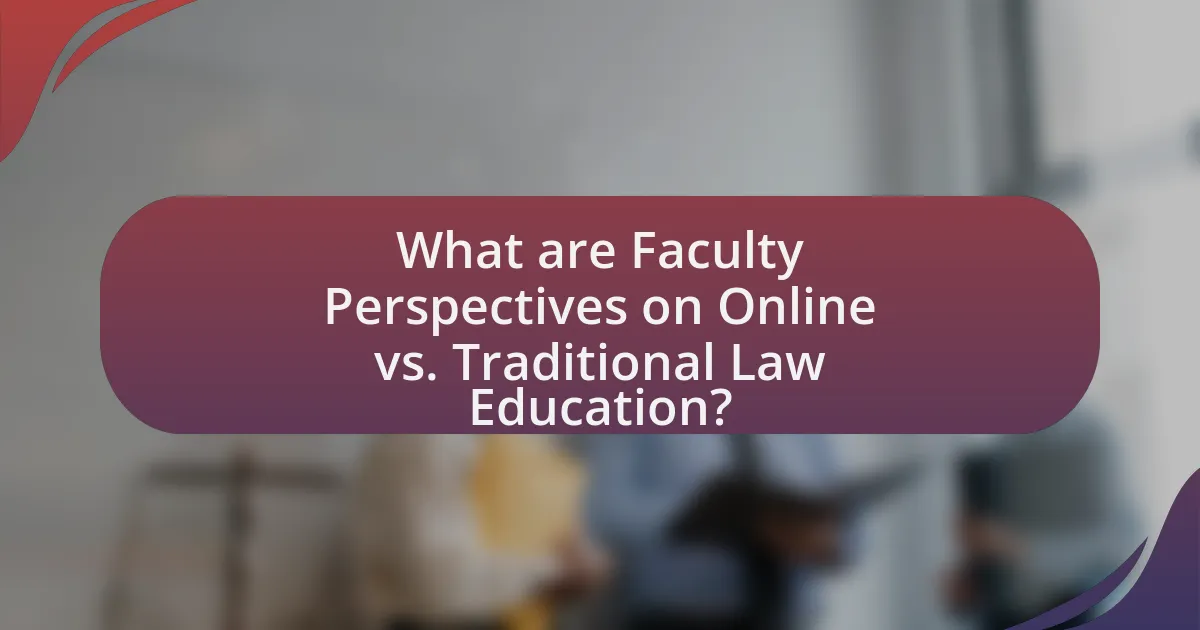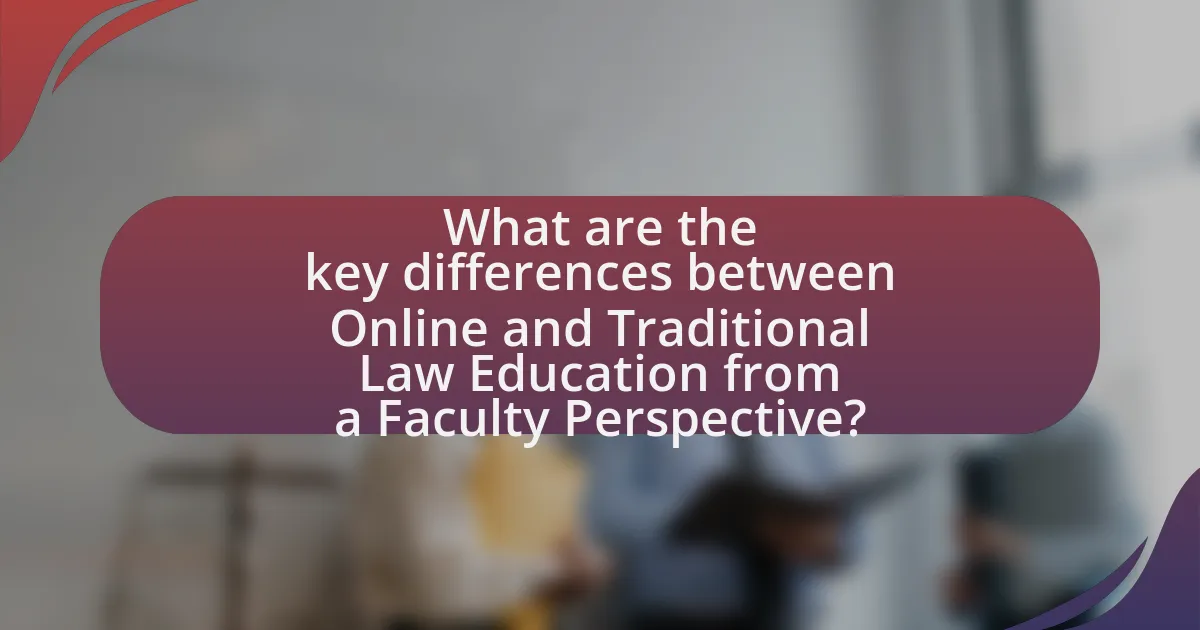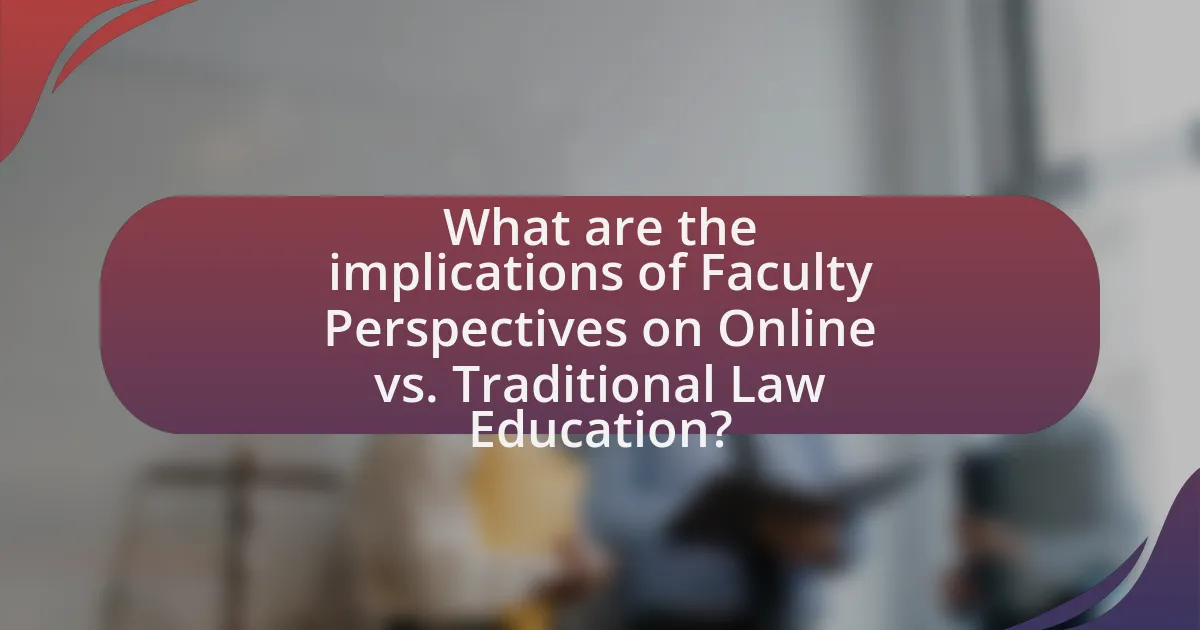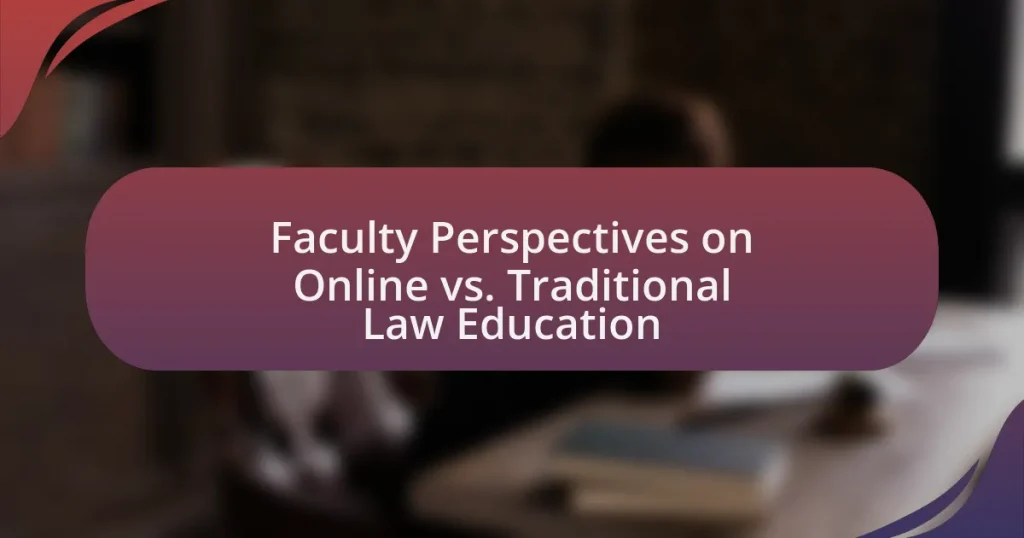The article examines faculty perspectives on online versus traditional law education, highlighting the significant differences in teaching methodologies, student engagement, and assessment strategies. Faculty members recognize the structured environment and interpersonal interactions of traditional education as beneficial for developing critical thinking and practical skills, while also acknowledging the flexibility and accessibility of online formats for non-traditional students. Concerns regarding student engagement and assessment integrity in online education are discussed, alongside the advantages of innovative teaching methods and broader audience reach. The article further explores how faculty experiences with technology and their views on student engagement influence their opinions on the effectiveness of both educational formats.

What are Faculty Perspectives on Online vs. Traditional Law Education?
Faculty perspectives on online versus traditional law education vary significantly, with many educators recognizing the benefits and challenges of both formats. Traditional law education is often praised for its structured environment, face-to-face interaction, and the development of practical skills through in-person experiences, which are crucial for legal training. Conversely, online law education is appreciated for its flexibility, accessibility, and the ability to reach a broader audience, particularly for non-traditional students who may have work or family commitments.
Research indicates that faculty members express concerns about the effectiveness of online education in fostering critical thinking and interpersonal skills, which are essential in the legal profession. A study published in the Journal of Legal Education found that while online programs can deliver content effectively, they often lack the experiential learning opportunities that traditional programs provide. This highlights a divide in faculty opinions, where some advocate for hybrid models that combine the strengths of both approaches to enhance legal education.
How do faculty members perceive the effectiveness of online law education compared to traditional methods?
Faculty members generally perceive online law education as less effective than traditional methods, primarily due to concerns about student engagement and the depth of learning. Research indicates that faculty often believe in-person interactions foster better critical thinking and collaboration skills, which are essential in legal education. A study published in the Journal of Legal Education found that 70% of law faculty expressed a preference for traditional classroom settings, citing the importance of face-to-face discussions and immediate feedback as key factors in effective learning.
What specific advantages do faculty see in online law education?
Faculty see several specific advantages in online law education, including increased accessibility for students, flexibility in scheduling, and the ability to reach a broader audience. Online platforms allow students from diverse geographical locations to enroll, thereby enhancing diversity within the classroom. Flexibility in scheduling accommodates working professionals and those with family commitments, making legal education more attainable. Additionally, online law education can utilize innovative teaching methods and technologies, such as interactive simulations and digital resources, which can enhance learning outcomes. These advantages are supported by studies indicating that online education can lead to comparable or improved student performance when compared to traditional classroom settings.
What challenges do faculty associate with online law education?
Faculty associate several challenges with online law education, including issues related to student engagement, assessment integrity, and the effectiveness of teaching methods. Faculty members often find it difficult to maintain student motivation and participation in a virtual environment, which can lead to lower levels of interaction compared to traditional classrooms. Additionally, concerns about the integrity of assessments arise, as online formats can make it easier for students to engage in dishonest practices. Furthermore, faculty may struggle to adapt their teaching strategies to effectively convey complex legal concepts through digital platforms, which can hinder the overall learning experience. These challenges highlight the need for ongoing support and resources to enhance online law education.
What factors influence faculty opinions on online versus traditional law education?
Faculty opinions on online versus traditional law education are influenced by factors such as perceived educational quality, student engagement, technological proficiency, and institutional reputation. Research indicates that faculty often view traditional education as providing a more rigorous and interactive learning environment, which they believe enhances critical thinking and practical skills essential for legal practice. Conversely, some faculty recognize the flexibility and accessibility of online education, particularly for non-traditional students, but may question its effectiveness in fostering the same level of engagement and mentorship. Additionally, faculty members’ comfort with technology and their own educational backgrounds play significant roles in shaping their perspectives, as those with positive experiences in online formats tend to advocate for them more strongly.
How does faculty experience with technology impact their perspectives?
Faculty experience with technology significantly shapes their perspectives on teaching methodologies. Faculty members who are proficient in technology tend to embrace online education, recognizing its potential for flexibility and accessibility, which can enhance student engagement. Conversely, those with limited technological experience may favor traditional methods, perceiving them as more effective for fostering interaction and learning. Research indicates that faculty comfort with technology correlates with positive attitudes towards online teaching, as evidenced by a study published in the Journal of Educational Technology & Society, which found that faculty who regularly use technology in their teaching report higher satisfaction and effectiveness in online courses.
What role does student engagement play in faculty views on law education formats?
Student engagement significantly influences faculty views on law education formats. Faculty members often perceive higher levels of student engagement as indicative of effective learning, which can lead to a preference for educational formats that foster interaction, such as traditional in-person classes. Research indicates that engaged students are more likely to participate actively in discussions, collaborate with peers, and demonstrate better academic performance, which faculty recognize as essential for successful legal education. Consequently, faculty may advocate for traditional formats that they believe enhance engagement, while also exploring online methods that incorporate interactive elements to maintain student involvement.

What are the key differences between Online and Traditional Law Education from a Faculty Perspective?
The key differences between Online and Traditional Law Education from a Faculty Perspective include teaching methods, student engagement, and assessment strategies. Faculty in traditional law education often utilize in-person lectures and Socratic methods, fostering direct interaction and immediate feedback, which enhances critical thinking and debate skills. In contrast, online law education relies on digital platforms, where faculty must adapt to asynchronous learning environments, often using recorded lectures and discussion boards, which can limit real-time interaction and engagement.
Additionally, faculty in traditional settings can observe non-verbal cues and classroom dynamics, allowing for tailored responses to student needs. Conversely, online faculty face challenges in gauging student comprehension and motivation, as they lack physical presence. Assessment methods also differ; traditional law education frequently employs in-class exams and oral arguments, while online education may rely more on written assignments and online quizzes, which can affect the evaluation of practical skills.
These differences highlight the need for faculty to develop new pedagogical strategies and tools to effectively engage students in online environments, as evidenced by studies showing varying levels of student satisfaction and learning outcomes between the two formats.
How do teaching methodologies differ between online and traditional law education?
Teaching methodologies in online law education primarily utilize digital platforms and asynchronous learning, while traditional law education relies on in-person lectures and synchronous interactions. Online law education often emphasizes self-directed learning, where students engage with materials at their own pace, utilizing resources such as recorded lectures, discussion forums, and interactive modules. In contrast, traditional law education fosters direct engagement through face-to-face discussions, Socratic questioning, and immediate feedback from instructors. Research indicates that online law programs can enhance accessibility and flexibility, accommodating diverse learning styles, while traditional methods are often praised for their ability to build interpersonal skills and foster a collaborative learning environment.
What instructional strategies are favored by faculty in traditional law education?
Faculty in traditional law education favor instructional strategies such as the Socratic method, case-based learning, and lecture-based instruction. The Socratic method encourages critical thinking and dialogue through questioning, allowing students to engage deeply with legal principles. Case-based learning involves analyzing real-world legal cases, which helps students apply theoretical knowledge to practical situations. Lecture-based instruction provides foundational knowledge and context for legal concepts. These strategies are supported by research indicating their effectiveness in developing analytical skills and understanding complex legal frameworks.
How do faculty adapt their teaching methods for online law education?
Faculty adapt their teaching methods for online law education by incorporating interactive technologies, restructuring course content, and emphasizing asynchronous learning. They utilize tools such as video conferencing, discussion forums, and online quizzes to engage students actively. Research indicates that faculty often redesign syllabi to include more multimedia resources and case studies relevant to online formats, enhancing student comprehension and participation. A study by the American Bar Association found that 85% of law faculty reported using online platforms to facilitate real-time discussions and collaborative projects, demonstrating a significant shift in pedagogical strategies to meet the demands of online learning environments.
What are the perceived outcomes for students in online versus traditional law education?
Perceived outcomes for students in online versus traditional law education vary significantly, with online education often associated with greater flexibility and accessibility, while traditional education is linked to enhanced networking opportunities and in-person engagement. Research indicates that students in online law programs report higher satisfaction regarding work-life balance and the ability to tailor their learning environment, as noted in a study by the American Bar Association, which found that 70% of online law students appreciated the convenience of remote learning. Conversely, traditional law students benefit from direct interaction with faculty and peers, which fosters a collaborative learning atmosphere, as highlighted in a survey conducted by the National Jurist, where 65% of traditional students valued the face-to-face mentorship and networking opportunities.
How do faculty assess student performance in online law courses?
Faculty assess student performance in online law courses primarily through a combination of assignments, quizzes, participation in discussions, and examinations. These assessment methods are designed to evaluate students’ understanding of legal concepts, critical thinking skills, and ability to apply legal principles in various scenarios. For instance, faculty often utilize written assignments to gauge analytical skills and comprehension of course materials, while online discussions allow for real-time engagement and assessment of students’ ability to articulate legal arguments. Additionally, quizzes and exams serve as standardized measures of knowledge retention and application. This multifaceted approach ensures a comprehensive evaluation of student performance in the online learning environment.
What feedback do faculty receive from students regarding their learning experiences?
Faculty receive feedback from students indicating that online learning offers flexibility and accessibility, while traditional education is valued for its interpersonal interactions and structured environment. Students often express a preference for the immediacy of feedback and engagement in traditional settings, citing that face-to-face discussions enhance understanding. Conversely, many students appreciate the convenience of online platforms, which allow for self-paced learning and access to resources at any time. This feedback is supported by studies showing that 70% of students in a survey preferred traditional methods for their collaborative aspects, while 60% acknowledged the benefits of online learning for balancing personal commitments.

What are the implications of Faculty Perspectives on Online vs. Traditional Law Education?
Faculty perspectives on online versus traditional law education significantly influence curriculum design, student engagement, and educational outcomes. Faculty members often express concerns about the effectiveness of online learning in fostering critical thinking and practical skills essential for legal practice, as evidenced by studies indicating that traditional classroom settings facilitate more interactive discussions and networking opportunities. Furthermore, faculty attitudes can shape institutional policies regarding technology integration and resource allocation, impacting the overall quality of legal education. For instance, research published in the “Journal of Legal Education” highlights that faculty who favor traditional methods may resist adopting online platforms, potentially limiting students’ access to diverse learning modalities.
How do faculty perspectives shape the future of law education?
Faculty perspectives significantly influence the future of law education by determining curriculum design, teaching methodologies, and the integration of technology. Faculty members, through their beliefs and experiences, shape how legal concepts are taught, which directly impacts student engagement and learning outcomes. For instance, a study published in the Journal of Legal Education found that faculty who embrace innovative teaching methods, such as experiential learning and online resources, enhance student preparedness for modern legal practice. This shift towards incorporating technology and diverse pedagogical approaches reflects faculty attitudes towards evolving legal landscapes, ultimately guiding the direction of law education to better align with the needs of the legal profession.
What trends are emerging in law education based on faculty feedback?
Emerging trends in law education based on faculty feedback include a growing preference for hybrid learning models that combine online and traditional methods. Faculty members have noted that this approach enhances accessibility and flexibility for students while maintaining the rigor of legal education. Additionally, there is an increasing emphasis on practical skills training, with faculty advocating for experiential learning opportunities such as clinics and simulations to better prepare students for real-world legal practice. This shift is supported by feedback indicating that students benefit from interactive and applied learning experiences, which are often more effectively delivered in a hybrid format.
How might faculty perspectives influence curriculum development in law schools?
Faculty perspectives significantly influence curriculum development in law schools by shaping the content, structure, and delivery methods of legal education. Faculty members, who possess expertise and experience in various legal fields, contribute to the curriculum by advocating for specific subjects, teaching methodologies, and assessment strategies that reflect their professional insights and pedagogical beliefs. For instance, faculty who prioritize practical skills may push for experiential learning opportunities, such as clinics or simulations, to better prepare students for real-world legal practice. Research indicates that faculty engagement in curriculum design leads to more relevant and effective educational programs, as seen in studies highlighting the correlation between faculty involvement and student satisfaction in legal education.
What best practices can be derived from faculty perspectives on law education formats?
Best practices derived from faculty perspectives on law education formats include the integration of interactive learning methods, the use of technology to enhance accessibility, and the emphasis on practical skills development. Faculty members advocate for interactive learning, such as simulations and role-playing, which have been shown to improve student engagement and retention of legal concepts. Additionally, the incorporation of technology, such as online resources and virtual classrooms, allows for greater flexibility and accessibility for diverse student populations. Furthermore, faculty emphasize the importance of practical skills training, including internships and experiential learning opportunities, which are critical for preparing students for real-world legal practice. These practices are supported by research indicating that active learning and practical experience significantly enhance law students’ educational outcomes.
What strategies can faculty implement to enhance online law education?
Faculty can enhance online law education by incorporating interactive learning tools, such as discussion forums and live webinars. These tools facilitate engagement and allow students to participate actively in their learning process. Research indicates that interactive elements in online courses can improve student retention rates by up to 60%, as they foster a sense of community and collaboration among learners. Additionally, faculty should utilize real-world case studies and simulations to provide practical applications of legal concepts, which can enhance critical thinking and problem-solving skills. Studies show that experiential learning approaches significantly increase students’ ability to apply theoretical knowledge in practical scenarios, making them more prepared for legal practice.
How can traditional law education adapt to incorporate online learning insights?
Traditional law education can adapt to incorporate online learning insights by integrating hybrid teaching models that combine in-person instruction with online resources and interactive platforms. This approach allows for greater flexibility in course delivery, enabling students to access materials and participate in discussions asynchronously, which has been shown to enhance learning outcomes. Research indicates that blended learning environments can improve student engagement and retention rates, as evidenced by a study published in the Journal of Legal Education, which found that law students in hybrid courses reported higher satisfaction and performance compared to those in solely traditional settings. By leveraging technology, traditional law schools can also facilitate collaborative learning through virtual simulations and online case studies, further enriching the educational experience.



